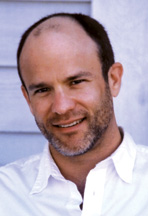
introducing readers to writers since 1995
June 27, 2005
Guest Author: Eric Dezenhall
by Ron Hogan Eric Dezenhall's latest novel, Shakedown Beach, just came out in paperback. Like his first two novels, Money Wanders and Jackie Disaster, it brings a little bit of Joe Klein (in his novelist mode) and a little bit of Carl Hiaasen to the less savory corners of New Jersey, where the difference between organized crime and organize politics can be merely a matter of perception. It's a field Dezenhall knows a bit about from his day job running Dezenhall Resources, a D.C.-based crisis management firm. So I asked him to explain just what his work experience brings to the writing table, and he very kindly obliged.
Eric Dezenhall's latest novel, Shakedown Beach, just came out in paperback. Like his first two novels, Money Wanders and Jackie Disaster, it brings a little bit of Joe Klein (in his novelist mode) and a little bit of Carl Hiaasen to the less savory corners of New Jersey, where the difference between organized crime and organize politics can be merely a matter of perception. It's a field Dezenhall knows a bit about from his day job running Dezenhall Resources, a D.C.-based crisis management firm. So I asked him to explain just what his work experience brings to the writing table, and he very kindly obliged.
Fictionalizing a Career in Damage Control
by Eric Dezenhall
My day job is damage control. I'm hired to make bad news go away. It's not easy to do because our culture demands bad news. In the twenty-plus years I've been defusing public relations bombs, I've noticed that as media crises--Martha Stewart, Enron, Kobe Bryant, Whitewater--have proliferated, so has America's evangelical belief in the spin doctor. That's where my novels come in. I chronicle spin--as a crime. Whereas conventional mysteries are whodunits, my books are essentially howdunits, exploring how massive deceptions are executed.Americans believe we are being "spun" by powerful, invisible forces. The spin doctor has become our culture's Merlin -- a pixie with transforming powers. I see it differently. I believe you can only spin a public that wants to be spun, that deceptions happen not only with our complicity, but with our active participation.
Each of my novels features a client who believes redemption comes in the form of publicity. I write about high-end sociopaths. Gutter scoundrels, like the ones Elmore Leonard writes about, wind up dead or in jail, but talented sociopaths end up running corporations or in the Senate. They don't get there by accident, they get there because we, the public, put them there.
My alter ego, disgraced, mob-connected pollster Jonah Eastman, helps high-end sociopaths fulfill their constitutional right to cheat their way to the American Dream through shameless propaganda. These "clients" see Jonah as someone who can make their dreams come true with the right lie.In my day job, I'm constrained by the law, ethics, my client's wishes, good judgment, and reality. As a writer, I have no such constraints, and can do anything to save anybody's reputation. Jonah Eastman is my "id." He's all of the rotten and fantastic things I think about doing in my job when I'm frustrated, but can't do because I have to operate in a civilized society where certain realities cannot be changed. Jonah does whatever it takes to get the job done. He's no angel, but he's effective because he knows what motivates people.
My novels are set in Atlantic City, in part because I spent my boyhood summers there, and in part because the town is a great metaphor for deception. At night, Atlantic City can be beautiful because light shines in all the right places (and avoids the wrong ones). Neon takes on dreamlike proportions. In the daytime, when the light shines everywhere, there is a banality, a disinfectant quality when the bleary-eyed heartland gamblers trudge out to the beach after getting wiped out at the black jack tables.
As Jonah proves through his representation of New Jersey Governor "Rebound" Rothman (in Shakedown Beach), you can fool all of the people who want to be fooled all of the time. He recognizes that the consumer public wants its news to be biased--biased in the direction of things we desperately want to believe. We accept the propaganda that we find validating.
your PayPal donation
can contribute towards its ongoing publication.